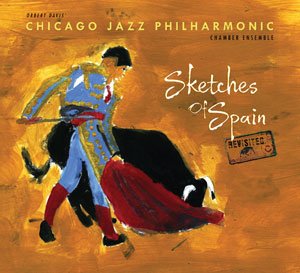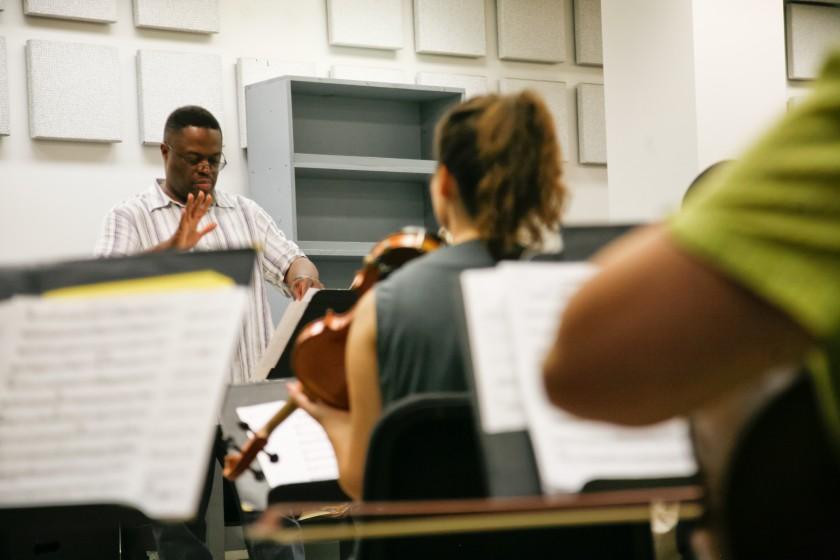
The halting, juddering opening of Mahler 9 is nicely characterised in this live reading. Low harp notes ring out like bells, the stuttering rhythm on cellos and horn sharply pointed. Michael Schønwandt conducted this performance at short notice owing to a colleague's illness, and there's an unusual flexibility and spontaneity on display. The build up to the first climax, three minutes in, is well handled. Schønwandt lets us hear all – the orchestral playing fiery and radiant, the tempi flowing. We're looking forward rather than gazing longingly backwards. Mahler's odder sonorities are painted with real skill, with muted trombones, bass clarinet and stopped horns making real impact. The funereal return of the opening rhythm is as disturbing as it should be, leading to the most bittersweet of recapitulations.
Mahler's middle movements aren't underplayed. The Ländler's gallows humour is dispatched with sly virtuosity. The final minutes are excellent, the bassoons matchless. Schønwandt's Rondo-Burlesque is taut and athletic, and he's excellent at separating the various contrapuntal lines. The central interlude is radiant, the Danish National Symphony Orchestra's strings warm and consolatory. It doesn't last, of course, and the clarinet's piercing entry is both comic and tragic. It's followed by a warm, radiant Adagio. The uncertainties and ambiguities aren't dodged, and the final wind down is wonderfully done. Fearless orchestral playing and a close, detailed recording add to the impact.
Three Poulenc ballets on one CD. Rejoice. On this well-filled disc they're all heard in piano reductions. If you already love these works you won't miss a thing. Poulenc's unique melodic and harmonic gifts mean that you'd happily listen to Les Biches played by a steel band or spoon ensemble. If you're composing a ballet score, the keyboard reduction will inevitably come first, and Poulenc never hid the fact that Les Biches and the Aubade began life as piano music. These performances by Jean-Pierre Amengard ooze conviviality. Les Biches has a delicious informality – the rtempi flexible, the mood improvisatory. The brief Adagietto is a highlight; Poulenc's gorgeous tune ebbing and flowing as if he's forgotten what comes next. The lesser-known Aubade is a spikier, more eclectic work, the musical allusions ranging from Mozart to Bartok. The final movement includes a supplementary part for a "third hand" – immaculately realised in this recording thanks to a spot of overdubbing.
Best of all is the American pianist Grant Johannesen's skilful transcription of the wartime ballet Les Animaux modèles, made in 1951 with Poulenc's approval. He admitted to a colleague in 1942 that he wasn't an innovative radical, but that there was “a place for new music that is happy to use the chords created by others.” It's a sublime work, the scenario based on a series of fables by La Fontaine. Offenbach and Paganini are alluded to, and Poulenc managed to insert an anti-German song into "Le lion amoureux" – a sly act of subversion seemingly unnoticed by the German officers who attended the premiere in occupied Paris. An unexpectedly delightful disc.
Orbert Davis first performed the solo trumpet part in Miles Davis's Sketches of Spain in 1995, in the first of several performances led by composer and arranger Bill Russo. Their interpretation of the work evolved over the years, Davis ultimately arranging his own version which he premiered with his own Chicago Jazz Philharmonic. What we hear isn't a straight reproduction, but a smart re-imagining. Gil Evans' orchestrations have been tweaked. The brass section have been reduced to just four. There's a now a bigger percussion department, along with piano and a string quartet. And while the opening and closing tracks remain the same, the three central numbers have been replaced by two new pieces and an arrangement of a movement from Albéniz's Iberia. The 1960 LP still sounds marvellous, and it's one of the most unjazzy things which Miles Davis ever put onto disc. Gil Evans' fastidious, studied backings underpin a solo part which rarely sounds improvised. Comparing the different versions of "Concierto de Aranjuez" and "Solea" is fascinating. Orbert Davis is recorded more closely, and his playing is showier and more extrovert than Miles's. Having a more assertive rhythm section is a plus, and the strings are used with discretion, notably providing a delicious, veiled intro to "Solea".
What about the additions? The shortest number, "Muerte de Matador", is the most successful. It begins wonderfully, with flamenco-like trumpet solos soaring over an inspired backing for oud and percussion. "El Moreno"'s funkiness can't help sounding intrusive – Steve Eisen's flamboyant, extended sax solo is too much of a good thing. Albéniz 's touristic "El Abaicin" is heard in an incongruous though enjoyable transcription for solo string quartet. The revamped percussion in "Solea" are well-judged, and there's an unexpected but effective reprise of the Rodrigo theme which kick-starts the entire work. All handsomely produced and well-performed – fans of the original should be entertained, not offended. Nice sleeve art too.















Add comment